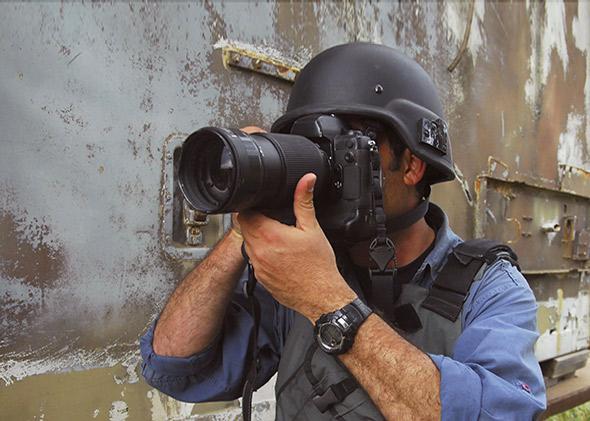The New York Times’ Lens Blog wrote this week about mothers who are conflict photographers. They interviewed several women—including Lynsey Addario, who was held prisoner in Libya in 2011 while covering the war there and now has a 2-year-old son—about how their work and lives have changed since becoming mothers. They all still go to dangerous parts of the world, and many spoke of the guilt, both culturally imposed and self-inflicted, that they feel over traveling for such long periods of time. Some take their children with them on assignment when possible, as evidenced by the accompanying slideshow of babies in Bjorns and on the hips of their moms as they work.
I loved the Times piece, but it made me wonder about the other half (well, more) of the story: war photographers who are dads. As the Lens post points out, the image of the war photographer is a hard-drinking Hemingway type who puts work before family. But because men now have a different relationship to family than they did just a few decades ago, I wanted to talk to male conflict photographers about how they managed families as well.
Ben Lowy, 35, is the father of a 5-year-old and a 3-year-old, and a freelance photographer who kicked off his career covering the Iraq war. His wife, Marvi Lacar, is also a freelance photographer. “Having kids was hard, because my wife’s career obviously was put on hold while she was pregnant,” Lowy explains. He was earning more money than she was, and because traveling was really hard for her while pregnant and nursing, they decided that he’d be the main earner in the family. “We came to an agreement that if she had to put off her career, I was going to put off doing spec projects. I only take paid-for assignments. I don’t do any work that’s self-generated. I’m not raiding the diaper fund,” Lowy explains. The deal was: They would both make some sacrifices.
Lowy hasn’t cut down his work in conflict and danger zones very much since becoming a dad. Over the past five years, he’s been in Afghanistan twice, in Haiti for the earthquake, in Libya twice, and in Yemen. He’s not setting out to cover conflict specifically, he says, but if he gets an assignment, he takes it. “I measure [each assignment] with business sense and being a father,” he said. He did turn down an assignment in Liberia this year because the client wouldn’t pay for an apartment for him to stay in during the 21-day incubation period of Ebola. “The client wasn’t willing to do it. I’m not willing to do it for you, and then potentially infect my kids,” Lowy says.
Lacar says that having a husband who’s a conflict photographer is no different than having a spouse who is a soldier or a police officer. “It feels just like what anyone would feel if their job was dangerous and could possibly result in harm or death,” Lacar explains. Lowy just came back from three months away, and Lacar says she is only able to manage because they moved to a house where her mother can live with the family and help out. Doing it all on her own was unsustainable. She wanted to step back from work a little both for biological reasons (pregnancy, nursing) and for pragmatic ones. “He just had the earning potential,” Lacar says. Now, she’s back working part time but mostly locally. She travels about one week a year.
The Times piece also made me curious about what it’s like growing up with a dad who is a conflict journalist. Carlos Boettcher, 28, followed his dad, award-winning war correspondent Mike Boettcher, into the family business. Carlos is a producer at ABC News, and he describes his beat as “human tragedy,” both in the U.S. and abroad. He and his father covered the Iraq and Afghanistan wars together, but before he starting working with his dad, Carlos says they didn’t have much of a relationship at all. This makes him wonder if he ever wants a family of his own while still covering the human tragedy beat. “I don’t know how much I want to have a child and still be doing this kind of thing. Not because of any particular danger to me, not because my kid might lose me, but because this type of work is so all-consuming, there’s so little left of you for anyone else,” Carlos says.
The business has changed a lot in the past few decades, though, allowing people to have families. “You can’t make it as a conflict photographer anymore,” Lowy told me. “You can’t make it as a niche journalist. It’s rare. You have to do other things. When I was in Libya, there were these BBC guys and Sky News guys, these 65-year-old camera guys, who are on their third marriage and their kids hate them. That’s the cliché of older journalists, and I think that because of the economy that’s changing, things are different for younger journalists.” To stay solvent, Lowy says photographers have to diversify their work and travel less, which leaves more time to devote to family.
Reporting in conflict zones is still a more arduous road for women, both because of institutional sexism in the industry and because women, if they have children, are still expected to be the primary caregivers. But it’s not easy for anyone to do this kind of job and raise kids. As Lacar puts it, “I understand [Ben’s] need to participate and play a role in history using the talent he was born with. I understand that. I don’t think it makes it any easier.”
